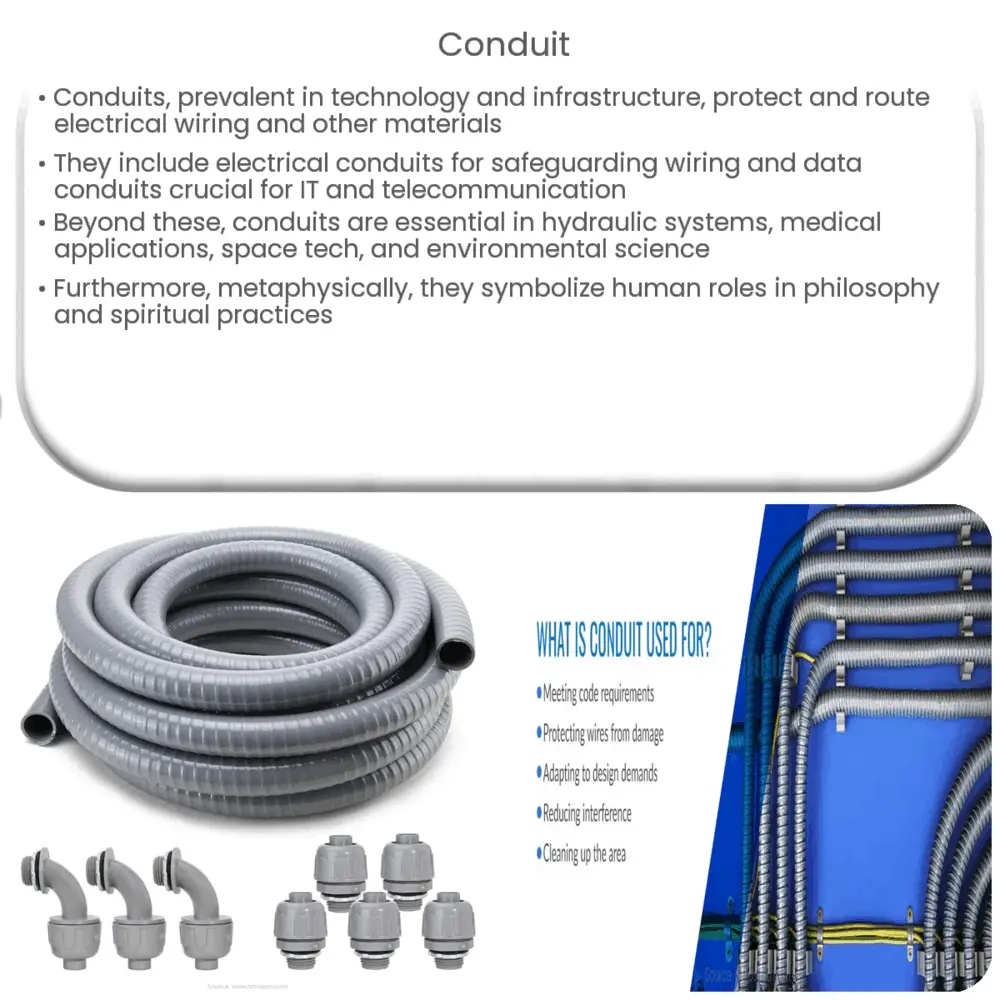Explore the multifaceted role of conduits in technology, infrastructure, philosophy, and spirituality, highlighting their critical importance.

Understanding Conduit in the Context of Technology and Infrastructure
Conduit, a term frequently utilized across various disciplines, is most commonly associated with the realm of technology and infrastructure. Essentially, a conduit refers to a tube, duct, or pipeline used to protect and route electrical wiring or other types of cables or fluid.
- 1 Electrical Conduit: This involves an array of tubes or channels that facilitate and safeguard the routing of electrical wiring. The objective is to protect the wiring from damage, thereby reducing the risk of electrical faults, fires, or other potential hazards. Electrical conduits are typically made from metal, plastic, or fiber, and are installed by electricians at the sites of commercial, industrial, and residential buildings.
- 2 Data Conduit: Also known as data pipelines, these are essential components of the information technology and telecommunications sectors. They guide and protect the transmission of data between servers, networks, and devices. In the contemporary digital age, data conduits are critical for smooth, secure, and efficient data exchange, enabling everything from internet browsing to confidential corporate communications.
In addition to these two primary types, conduits can also be employed in various other sectors and applications, such as hydraulic systems, medical applications, and more. Regardless of their specific use, the primary role of a conduit remains consistent: to serve as a protective passageway for the materials or information being transported.
- a Hydraulic Systems: In the field of hydraulic systems, conduits—often referred to as pipes or tubes—are utilized to transfer fluid under pressure. In these contexts, they are designed to withstand the pressures involved and to prevent leaks that could compromise the system’s functionality.
- b Medical Applications: In the medical field, the term “conduit” can reference a replacement vessel, often used in heart surgery, to reroute blood flow around a blocked artery. The conduits used in these procedures are typically either synthetic tubes or vessels harvested from another part of the patient’s body.
In conclusion, while the term “conduit” may be simple in its definition, it holds a multifaceted significance within the spheres of technology and infrastructure. As such, it plays a fundamental role in shaping our daily lives and the larger world around us.
The Versatility and Importance of Conduits
As we delve further into the applications of conduits, we also uncover their prevalence in less expected sectors such as space technology and environmental science.
- c Space Technology: In the aerospace sector, conduits are essential for protecting and guiding the myriad of electrical wires within spacecraft. This not only safeguards the complex machinery but also ensures the safety of the astronauts aboard.
- d Environmental Science: Within environmental science, conduits—often referred to as channels or ducts—play a vital role in monitoring air and water quality. For instance, air sampling conduits collect samples for analysis, while water conduits help in routing water for testing or treatment purposes.
On the less tangible side, the term “conduit” can also find its place in metaphysical discussions. For instance, in philosophical contexts, human beings can be thought of as conduits for ideas and knowledge. Similarly, in spiritual practices, a conduit might refer to an individual who channels spiritual energy or messages.
- 3 Philosophical Conduit: In philosophical contexts, the term “conduit” can metaphorically represent the human mind’s ability to absorb, process, and transmit information and ideas. This perspective emphasizes the importance of humans as mediators of knowledge, helping to facilitate understanding and learning.
- 4 Spiritual Conduit: In various spiritual practices, a conduit refers to a person who serves as a channel for spiritual energy or divine messages. This notion emphasizes the perceived connection between the physical and the metaphysical world.
Conclusion
In essence, a conduit—be it physical or metaphorical—serves as a vital link, ensuring the smooth flow and protection of valuable resources, be they electrical wires, data, fluids, ideas, or spiritual energy. Its ubiquitous presence in numerous fields underlines the fundamental importance of this concept across a vast array of disciplines. The versatile use of conduits, from the highly tangible world of technology and infrastructure to the intangible realms of philosophy and spirituality, highlights their indispensable role in facilitating connection, protection, and progress in our complex world.

